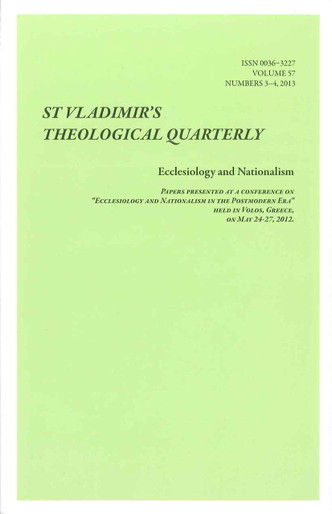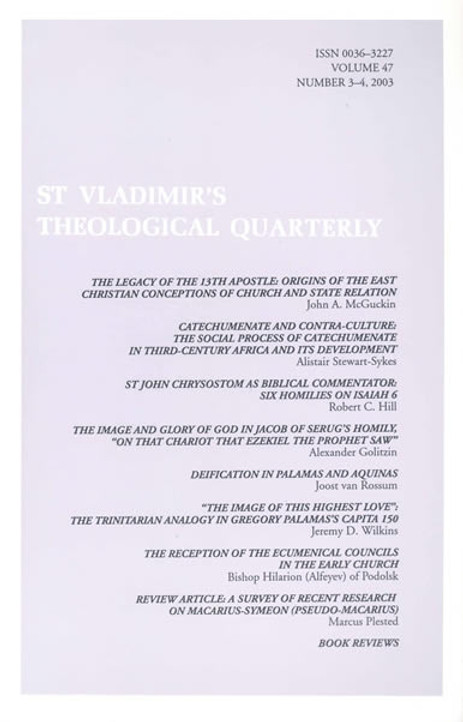This double issue of the Quarterly contains nearly all the papers presented at a conference on “Ecclesiology and Nationalism in the Postmodern Era” held in Volos, Greece, on May 24–27, 2012. The topic is most timely, given that negotiations to prepare for a pan-Orthodox council have in recent years broken down precisely over questions of nationalism, of ways by which autocephaly is achieved, and different views of how to deal with the so-called “diaspora.” Indeed, these failed attempts reveal sharp ecclesiological divisions in the Orthodox world. Added to this is the challenge posed to contemporary Orthodoxy by a globalized, post-modern world. The Orthodox Churches, faced with these internal and external threats, are challenged to find solutions appropriate not to a bygone past, but to the present and the future.
The conference was jointly sponsored and organized by the Volos Academy for Theological Studies (Volos, Greece), the Chair of Orthodox Theology, Münster University (Germany), the Center of Orthodox Christian Studies of Fordham University (New York), the Romanian Institute for Inter-Orthodox, Inter-Confessional, Inter-Religious Studies (INTER, Cluh-Napoca, Romania), the Christian Cultural Center in Belgrade (Serbia), the St Andrew’s Biblical Theological Institute (Moscow), the Valamo Lay Academy (Finland), and the European Forum of Orthodox Schools of Theology (EFOST, Brussels). Generous hospitality for the conference was provided by His Eminence, Metropolitan Ignatius of Demetrias, Chairman of the Board of Directors of the Volos Academy. Particular thanks are owed to the staff of the Volos Academy, particularly Dr Pantelis Kalaitzidis, the Director, as well as Volos Academy staff members Nikos Asproulis and Rev Dr Gregory Edwards, who assisted in the collection and translation of the numerous articles in this special issue.
— Paul Meyendorff , Editor
CONTRIBUTORS
“Neither Jew nor Greek”: Catholicity and Ethnicity
Metropolitan Kallistos Ware of Diokleia . . . . . . . . . . . . . . . . . . . . 235
Orthodoxy and Nationalism: The Autocephaly of the Church of “Moldo-Roumania”
Lucian N. Leustean . . . . . . . . . . . . . . . . . . . . . . . . . . . . . . . . . 247
Enlightenment, Nationalism, the Nation State and Their Impact on the Orthodox world
Paschalis Kitromilides . . . . . . . . . . . . . . . . . . . . . . . . . . . . . . . 271
Orthodoxy and Nationalism in Russian Orthodoxy
Daniela Kalkandjieva . . . . . . . . . . . . . . . . . . . . . . . . . . . . . . . 281
Orthodox Ecumenicity and the Bulgarian Schism
Dimitrios Thrassyvoulos Stamatopoulos . . . . . . . . . . . . . . . . . . . . 305
Why Are Orthodox Churches Particularly Prone to Nationalization and Even to Nationalism?
Vasilios N. Makrides . . . . . . . . . . . . . . . . . . . . . . . . . . . . . . . . 325
Beyond Nationalism? The Case of the Orthodox Church of Antioch
Assaad Elias Kattan . . . . . . . . . . . . . . . . . . . . . . . . . . . . . . . . . 353
Church and Nation in the New Testament: The Formation of the Pauline Communities
Christos Karakolis . . . . . . . . . . . . . . . . . . . . . . . . . . . . . . . . . 361
Ethnophyletism, Autocephaly, and National Churches —A Theological Approach and Ecclesiological Implications
Paul Meyendorff . . . . . . . . . . . . . . . . . . . . . . . . . . . . . . . . . . 381
The Construction of the National Idea and Identity through Ecclesiastical Narratives
Dragica Tadić-Papanikolaou . . . . . . . . . . . . . . . . . . . . . . . . . . . 395
Church and Nation: Looking through the Glasses of Post-Secularism
Cyril Hovorun . . . . . . . . . . . . . . . . . . . . . . . . . . . . . . . . . . . 423
Ethno-Phyletism and the [So-called] Ecclesial “Diaspora”
Grigorios D. Papathomas . . . . . . . . . . . . . . . . . . . . . . . . . . . . . 431
Primacy and Nationalism
Metropolitan John Zizioulas of Pergamon . . . . . . . . . . . . . . . . . . . 451
Signs of National Socialism in the Greek Church?
Athanasios N. Papathanasiou . . . . . . . . . . . . . . . . . . . . . . . . . . . 461
Ecclesiology and Globalization: In Search of an Ecclesiological Paradigm in the Era of Globalization (After the Previous Paradigms of the Local, Imperial, and National)
Pantelis Kalaitzidis . . . . . . . . . . . . . . . . . . . . . . . . . . . . . . . . . 479
Nationalism, Statism, and Orthodoxy
Davor Džalto . . . . . . . . . . . . . . . . . . . . . . . . . . . . . . . . . . . . 503
“Political Orthodoxy”: Religion’s Involvement in the Identity Formation Process
Alexander Verkhovsky . . . . . . . . . . . . . . . . . . . . . . . . . . . . . . . 525






